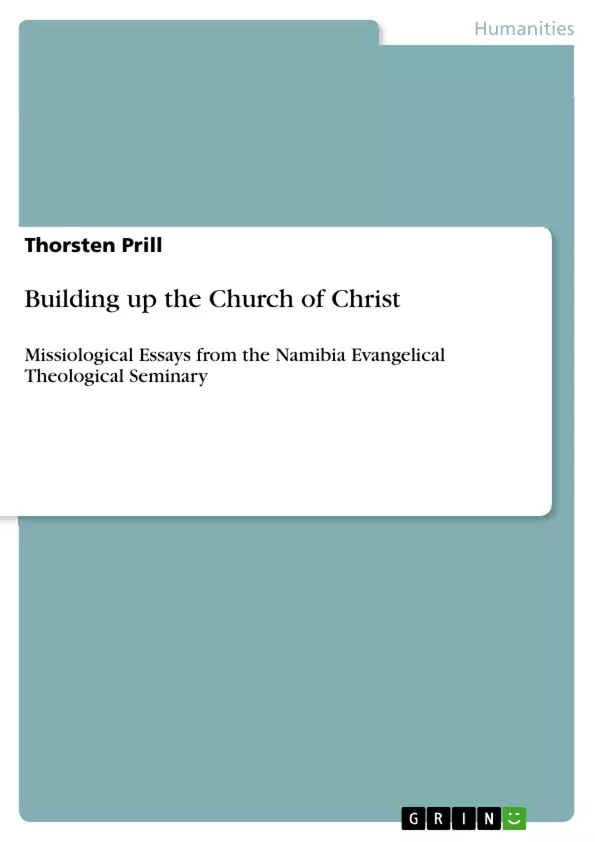Established in 1991, the mission of the Namibia Evangelical Theological Seminary (NETS) is to equip Christians with knowledge and skills to live godly lives and serve the Church and the wider community. The purpose of this book is to contribute to the accomplishment of this mission. It is the first volume of essays by NETS faculty members. Each essay is a sustained reflection on a particular aspect of God’s mission in southern Africa and beyond. Josh Hooker gives a reflection upon the role of theological education in the southern African context. For him the crucial question is: Are we truly equipping Christians for ministry? Basilius Kasera examines the impact of modern heresies, such as prosperity gospel and open theism, on the church in Namibia in the light of Genesis 3:1-5. Thorsten Prill tests the claim that evangelism has never been popular both as a concept and a ministry. For this he investigates four 20th century theologians (Barth, Bonhoeffer, Tillich and Moltmann) who have had a significant influence on theological thinking both in European and North American mainstream Protestant denominations and in mission initiated churches in southern Africa. In a second essay he explores the relationship between globalisation and mission.
Inhaltsverzeichnis (Table of Contents)
- Theological Education:
- Theological education in southern Africa: the challenge of turning rhetoric into reality
- Evangelism:
- Theological giants and the evangelistic dimension of mission
- Apologetics:
- The Battle for truth in Namibia
- Missional Theology:
- Globalisation and mission: what do missiologists mean when they speak of globalisation?
Zielsetzung und Themenschwerpunkte (Objectives and Key Themes)
This book, the first volume of essays by NETS faculty members, aims to contribute to the seminary's mission of equipping Christians with the knowledge and skills to live godly lives and serve the Church and the wider community. The essays reflect on different aspects of God's mission in southern Africa and beyond.
- The role and effectiveness of theological education in equipping Christians for ministry
- The impact of "modern heresies" on the church in Namibia
- The significance of evangelism and its place in theological thought
- The relationship between globalisation and mission
- The challenges faced by pastors in their ministry
Zusammenfassung der Kapitel (Chapter Summaries)
- Theological Education: The Challenge of Turning Rhetoric into Reality: This chapter explores the role of theological education in southern Africa, questioning whether institutions are truly equipping Christians for ministry. The author highlights the importance of connecting with local churches and provides examples of how NETS is seeking to turn rhetoric into reality through programs like Word Alive and Pastors' Retreat.
- Theological Giants and the Evangelistic Dimension of Mission: This essay examines the views of four influential 20th-century theologians (Barth, Bonhoeffer, Tillich, and Moltmann) on the concept of evangelism. It challenges the notion that evangelism is unpopular and analyzes its significance within a broader missiological context.
- The Battle for Truth in Namibia: This chapter delves into the impact of "modern heresies," such as prosperity gospel and open theism, on the church in Namibia. The author explores these theological movements in light of Genesis 3:1-5 and their implications for the faithful practice of Christianity in the Namibian context.
Schlüsselwörter (Keywords)
The key themes and concepts explored in this book include theological education, evangelism, mission, globalisation, modern heresies, prosperity gospel, open theism, and the spiritual health of pastors. The essays highlight the importance of practical ministry, equipping Christians for service, and the challenges faced by the church in southern Africa.
Frequently Asked Questions
What is the mission of the Namibia Evangelical Theological Seminary (NETS)?
NETS aims to equip Christians with the knowledge and skills to live godly lives and serve the Church and the wider community in Namibia and beyond.
What "modern heresies" are discussed in the book?
The book examines the impact of the prosperity gospel and open theism on the Namibian church in light of biblical teachings.
How does the book view the relationship between globalisation and mission?
It explores what missiologists mean by globalisation and how this global phenomenon affects missionary work and theological thinking.
Which famous theologians are analyzed regarding evangelism?
The book investigates the views of Karl Barth, Dietrich Bonhoeffer, Paul Tillich, and Jürgen Moltmann on the evangelistic dimension of mission.
What is the challenge for theological education in southern Africa?
The main challenge is turning academic rhetoric into reality by truly equipping Christians for practical ministry and the spiritual health of pastors.
What programs does NETS use to support local pastors?
NETS implements programs such as "Word Alive" and "Pastors' Retreat" to strengthen the connection between theological education and local church needs.
- Arbeit zitieren
- Dr. Thorsten Prill (Autor:in), 2010, Building up the Church of Christ, München, GRIN Verlag, https://www.grin.com/document/152255



